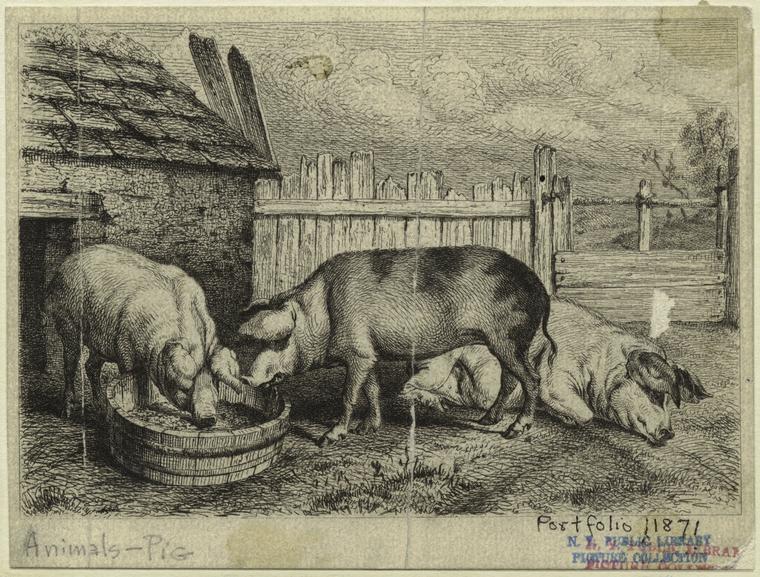This semester I've been a teaching assistant in an upper-level undergraduate course on American environmental history. At the final class meeting, the professor asked the students to take out a sheet of paper and write down 10 things they’ll take away from this course. I've been reading
 over their responses, which are an interesting combination of curious facts they picked up in class, and possibly life-changing insights.
over their responses, which are an interesting combination of curious facts they picked up in class, and possibly life-changing insights.The most commonly repeated curious fact was that pigs once roamed the streets and alleys of New York City, which I suppose was a surprise to many of the students. Others wrote they had been surprised that Central Park is completely artificial, that the interstate highway system was sold to the American people as a form of national defense, and that the “whole Earth” photographs taken from Apollo spacecraft were one of the catalysts for environmentalism. And that Mexico City has always been one of the major population centers of the Americas (this is a favorite of mine because it was something that I mentioned in a discussion section).
More interesting, from the perspective of the course’s objectives, were responses about the nature of wilderness, the role of government in environmental change, and the role activists and even extremists have played throughout American history supporting environmental causes. Most of the students successfully absorbed the course theme that not only
 wilderness but all of our ideas of nature are in fact ideas which change over time. Several students also remarked on how extensively the land patterns we see today are the result of government actions in the past, from the Northwest Ordinance through urban redlining. Many also remarked on their surprise that major environmental damage as well as movements to protect the environment began much earlier in American history than they had believed.
wilderness but all of our ideas of nature are in fact ideas which change over time. Several students also remarked on how extensively the land patterns we see today are the result of government actions in the past, from the Northwest Ordinance through urban redlining. Many also remarked on their surprise that major environmental damage as well as movements to protect the environment began much earlier in American history than they had believed.Although several students said they had learned that the government is responsible for creating (or at least not preventing) a lot of the problems we have today, many also recalled positive results of government influence like the national park system, the Civilian Conservation Corps, etc. They seem to have accepted the role of radicals like Henry David Thoreau and John Muir in pushing society in the right direction; one student even went beyond the required 10 things she was supposed to write, remarking that you can't criticize a society from within, but must separate yourself from it as Thoreau tried to do at Walden. One item
 I was disappointed I did not see was evidence that the students had understood the complicated process of subtle changes in law and social customs described by Ted Steinberg in Nature Incorporated, which they read early in the semester. I think this is crucial to the story of the American environment, so I’ll be spending some time thinking about how to make it a more central part of the students’ experience in my own syllabus.
I was disappointed I did not see was evidence that the students had understood the complicated process of subtle changes in law and social customs described by Ted Steinberg in Nature Incorporated, which they read early in the semester. I think this is crucial to the story of the American environment, so I’ll be spending some time thinking about how to make it a more central part of the students’ experience in my own syllabus.Probably the biggest action-oriented takeaway in the students’ responses related to meat--and especially to corn-fed beef. Late in the semester, we watched a couple of clips from the documentary King Corn. As a result, many students said they would no longer take what they eat for granted. Food “came from somewhere and is going somewhere too,” said one student. Several said they would begin to look closely at what they eat and would try to eliminate corn sweeteners from their diets (this is something I've actually begun trying to do myself). Perhaps the most satisfying comment came from a student who concluded her list by observing, “I have learned that we must be the change we wish to see!” That makes the semester seem like time well spent.






4 comments:
As much as I like to bemoan student evaluations and their superficial nature, I have to say that I love the exercise of asking students at the end of the semester what their "biggest take-away" is from the class. Having them list several is a good idea. I have learned a great deal pedagogically when I have done this. It is very interesting to see what students think the Big Ideas were. And having an "action plan" is a great addition to this exercise. Even in courses which seem to lend themselves less to activism, it is useful for students to see that something can change in their lives from having learned about the past. Thanks for sharing, Dan!
I'm with you, Lisa. I think it's a great idea. I do cringe a bit, though, at the thought of what some of their answers might be.
This sounds like a very interesting course - I wish I could have been in attendance! I think I might start asking students what they will take away from the art history classes that I teach.
-Monica
http://albertis-window.blogspot.com
Post a Comment